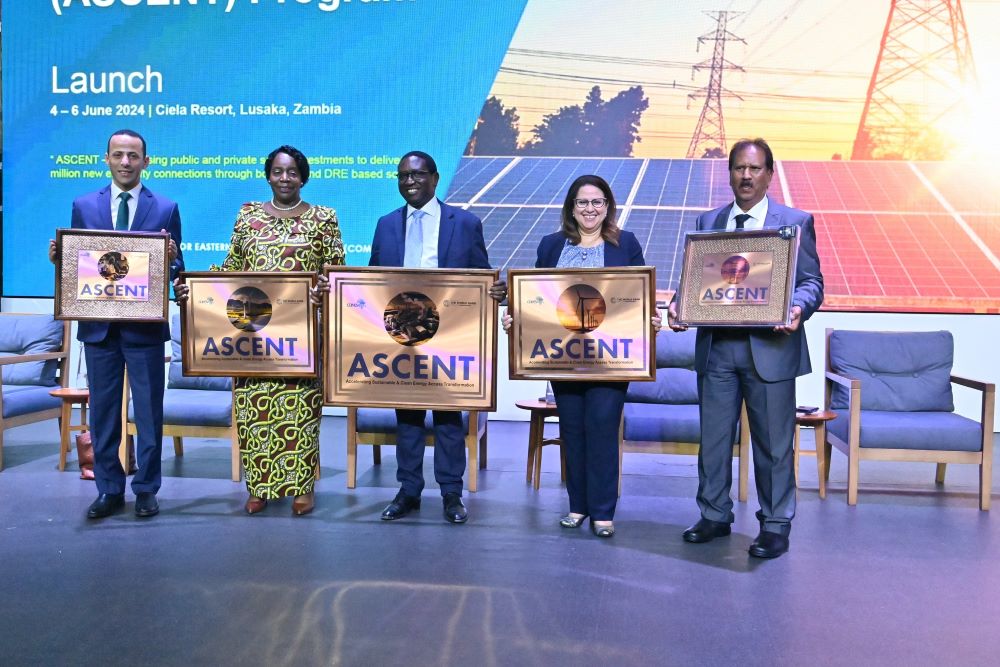
Lusaka, Tuesday, June 4, 2024: COMESA and the World Bank have today launched a USD 5 Billion energy programmes dubbed the Accelerating Sustainable and Clean Energy Access Transformation (ASCENT) programme. ASCENT programme is aimed at accelerating energy access efforts in the eastern and southern African region, with a target delivery of new electricity connections for 100 million people.
The program development objective, to which participating countries and regional institutions will contribute, is to increase access to sustainable and clean energy in Eastern and Southern African countries. Access to energy includes on-grid and off-grid (DRE) electricity solutions and clean cooking.
COMESA Secretary General, Ms. Chileshe Mpundu Kapwepwe and World Director of Regional Integration Africa, Middle East and North Africa H.E Ms. Boutheina Guermazi launched the programme in Lusaka, Zambia in the presence of the Honourable Peter Kapala, Minister of Energy of Zambia.
The main beneficiaries of the ASCENT program are people, including women, in the Eastern and Southern Africa (AFE) region who will gain access to a sustainable supply of electricity and clean cooking, along with the associated benefits that accrue from having energy access.
ASCENT is conceived as a comprehensive accelerator of energy access efforts in the AFE region, aiming at the delivery of new electricity connections for 100 million people through both grid- and Distributed Renewable Energy (DRE)-based solutions. ASCENT will leverage the proposed International Development Association (IDA) envelope of US$5 billion to signal the World Bank’s commitment to achieving SDG7 in the Eastern and Southern Africa region and mobilize an additional US$10 billion from development partners, governments, national utilities, private-sector and commercial funders, carbon markets, climate and other impact-oriented financiers, and philanthropic and other partners.
The Multiphase Programmatic Approach (MPA) is IDA financed and anticipates that up to 20 countries in the Eastern and Southern Africa (AFE) region will participate in ASCENT. IDA-eligible countries can be financed from the US$5 billion ASCENT envelope. In addition, IBRD countries with energy access deficits (Angola, Botswana, Eswatini, Namibia, and South Africa) may participate in the Program through IBRD borrowing, and to access climate finance, carbon financing platforms and the private-sector dialogue.
In her remarks, World Bank Director of Regional Integration Africa and Middle East and North Africa H.E Ms. Boutheina Guermazi said “ensuring access to reliable and affordable energy for all is a key element of the World Bank Regional Integration Strategy for Africa. It is essential to strengthen regional integration, giving boost to trade in goods and services, allowing digital transformation, attracting investments, and allowing faster flow of knowledge and innovations.”
Secretary General Chileshe Mpundu Kapwepwe in her remarks observed that financial resources are essential, but they are not sufficient on their own.
“We need a holistic approach to the energy challenge that includes support to policy and legal reforms, technical assistance, capacity building and outreach activities, among others. I am glad to note that all these aspects are embedded in the design of the ASCENT Project.”
Honourable Peter Kapala, Minister of Energy of Zambia who also addressed the meeting emphasized the importance of creative financial instruments and frameworks in mobilizing required resources for sustainable energy.
“Financial instruments such as blended finance play a vital role in de-risking projects and attracting private funds,” he said.
Speeches

